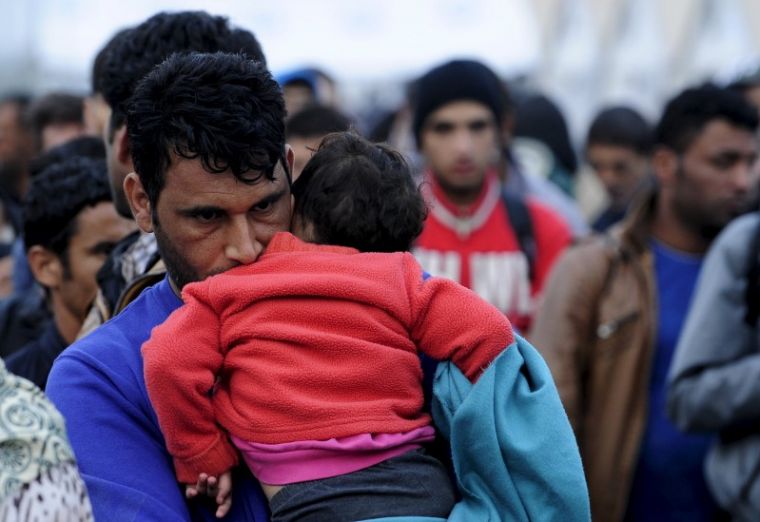Serbia and Croatia at odds over migrant crisis as tensions rise

Former Yugoslav foes Serbia and Croatia traded embargoes and insults on Thursday in the latest fallout from Europe's failure to agree a comprehensive response to the tide of migrants streaming north through the Balkans.
After weeks of recrimination and buck-passing, a summit on Wednesday did produce a glimmer of political unity between EU states on measures to help the refugees closer to home, or at least register their asylum requests as soon as they enter the European Union.
But all attempts in recent weeks to stem the flow have only prompted more desperate people to make a dash for Europe before the doors are shut or winter makes the journey too perilous.
On Thursday alone, about 1,200 people crossed in boats from Turkey to the Greek island of Lesbos in under an hour, following the 2,500 who had made the dangerous passage the previous day.
German Chancellor Angela Merkel, the European leader who has done most to welcome refugees, told her parliament that the EU was "still a long way from where we must get to".
Nowhere was that more evident than in eastern Europe, where beggar-my-neighbour policies have led countries alternately to try to block the flow or shunt it somewhere else.
Until last week, most of those fleeing war or poverty in Syria, Iraq, Afghanistan and elsewhere were finding that the quickest route into the EU, and their preferred destination of Germany, was from Serbia into Hungary.
But since Hungary sealed its border with razor-wire, an overwhelmed Serbia has simply diverted almost 50,000 migrants to the EU's newest member state, Croatia, which says it also cannot keep pace with the influx.
Demanding that Serbia send at least some of the migrants to Hungary or Romania, Croatia barred all Serbian-registered vehicles from crossing from Serbia.
"Making fools of us"
Croatian Prime Minister Zoran Milanovic said he would not let Serbia "make fools of us...We can function with 4,000 to 5,000 people a day. But more than that will not work, and I will not allow it."
Serbian Justice Minister Nikola Selakovic said Serbia had been "brutally attacked", and its Foreign Ministry compared the restrictions to racial laws enforced by the Nazi puppet state in Croatia in World War Two.
Belgrade in turn blocked Croatian goods and cargo vehicles, and the escalating dispute threatened to undo 15 years of progress towards reconciling two countries that were enemies during Yugoslavia's bloody collapse in the 1990s.
In a bid to forestall such disputes, EU leaders on Wednesday night pledged at least 1 billion euros for Syrian refugees that remain in the Middle East.
The summit also decided that EU-staffed "hotspots" would be set up in Greece and Italy by November to register and fingerprint new arrivals and start the process of relocating Syrians and others likely to win refugee status to other EU states, while deporting those classed as economic migrants.
The meeting eased some of the acrimony seen at an interior ministers meeting on Tuesday when four eastern EU countries who opposed a plan to distribute 120,000 asylum seekers proportionally among member states were simply outvoted.
That number is still only a fraction of the almost half a million refugees and migrants who have reached the EU this year.
"I am deeply convinced that Europe not only needs a redistribution (of refugees), but that, much more, it needs a long-term process for a fair distribution of refugees among member states," Merkel told the German parliament.
But Hungary said it might challenge even the existing distribution scheme in court.
"The quota proposal is a typical example of the moral imperialism that Germany forces upon Europe," Janos Lazar, Prime Minister Viktor Orban's chief of staff, told reporters.
He also said that Hungary might consider simply letting migrants coming from Croatia pass through by train or bus, if Austria and Germany agreed to accept them.
Pushing back
Meanwhile the wealthier countries of northern Europe are starting to push back some of the thousands of people who have crossed their borders, reasserting the principle that refugees must request asylum at the point where they enter the 28-nation bloc, one of Hungary's central demands.
Austrian Interior Minister Johanna Mikl-Leitner said her country, which together with Germany temporarily waived this rule for Syrian refugees three weeks ago, had sent back more than 5,000 migrants to safe EU countries they had crossed.
To the east, Bulgaria, a much poorer, formerly communist state which fears that its borders could also be overwhelmed, said the EU was struggling to catch up with events.
"In the EU we gather only to say how many billions should be allocated and where to relocate the migrants. We cannot take any other decisions that get ahead of events," Prime Minister Boiko Borisov told reporters.
Germany's warm welcome for refugees, especially those from Syria, stems partly from the view of business and government there that migration can help counter the effects of an ageing population and prevent a shortage of labour.
Nevertheless, many Germans, not least some of the conservative Merkel's political allies, are concerned about how easily the newcomers can be integrated.
Germany expects to receive 800,000 migrants in 2015, but even last year the population rose by 430,000 to 81.2 million, its biggest jump since 1992, the German statistics office said.
A strong economy means many will find work. German unemployment is expected to fall by 100,000 this year, although
the labour office research institute IAB said it could rise again by 70,000 in 2016 under the influx of newcomers.











